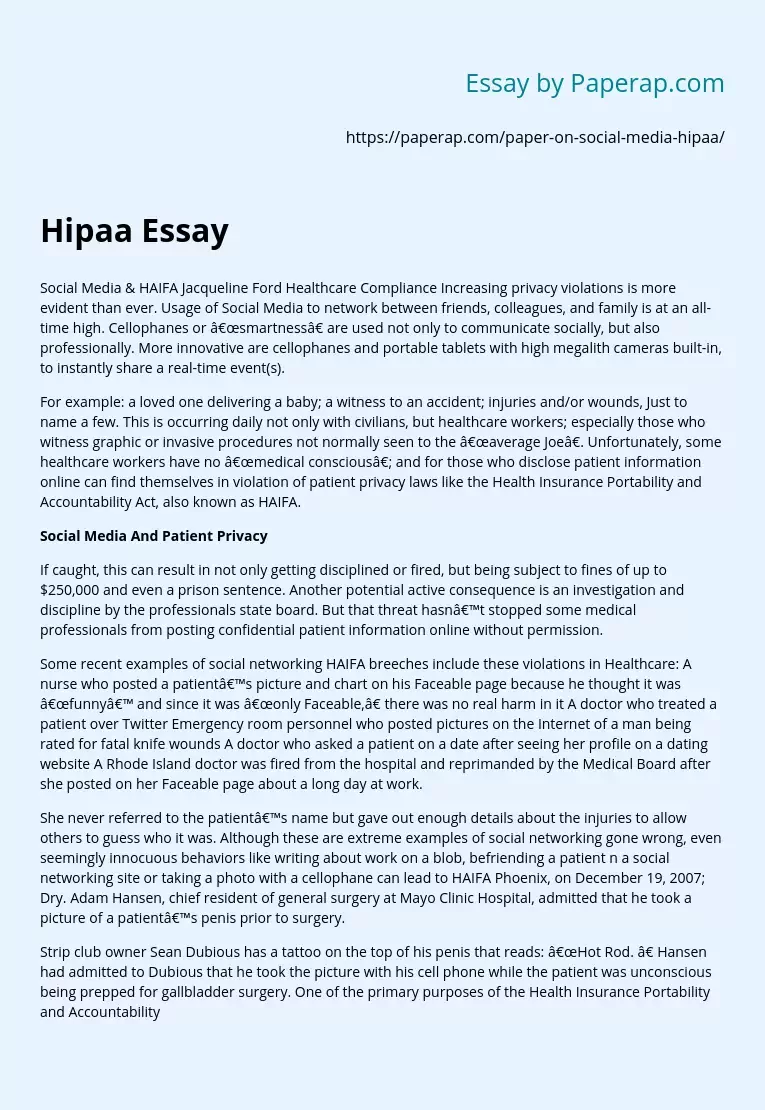Social Media and Healthcare Privacy.
Social Media & HAIFA Jacqueline Ford Healthcare Compliance Increasing privacy violations is more evident than ever. Usage of Social Media to network between friends, colleagues, and family is at an all-time high. Cellophanes or “smartness” are used not only to communicate socially, but also professionally. More innovative are cellophanes and portable tablets with high megalith cameras built-in, to instantly share a real-time event(s).
For example: a loved one delivering a baby; a witness to an accident; injuries and/or wounds, Just to name a few.
This is occurring daily not only with civilians, but healthcare workers; especially those who witness graphic or invasive procedures not normally seen to the “average Joe”. Unfortunately, some healthcare workers have no “medical conscious”; and for those who disclose patient information online can find themselves in violation of patient privacy laws like the Health Insurance Portability and Accountability Act, also known as HAIFA.
Social Media And Patient Privacy
If caught, this can result in not only getting disciplined or fired, but being subject to fines of up to $250,000 and even a prison sentence.
Another potential active consequence is an investigation and discipline by the professionals state board. But that threat hasn’t stopped some medical professionals from posting confidential patient information online without permission.
Some recent examples of social networking HAIFA breeches include these violations in Healthcare: A nurse who posted a patient’s picture and chart on his Faceable page because he thought it was “funny’ and since it was “only Faceable,” there was no real harm in it A doctor who treated a patient over Twitter Emergency room personnel who posted pictures on the Internet of a man being rated for fatal knife wounds A doctor who asked a patient on a date after seeing her profile on a dating website A Rhode Island doctor was fired from the hospital and reprimanded by the Medical Board after she posted on her Faceable page about a long day at work.
She never referred to the patient’s name but gave out enough details about the injuries to allow others to guess who it was. Although these are extreme examples of social networking gone wrong, even seemingly innocuous behaviors like writing about work on a blob, befriending a patient n a social networking site or taking a photo with a cellophane can lead to HAIFA Phoenix, on December 19, 2007; Dry. Adam Hansen, chief resident of general surgery at Mayo Clinic Hospital, admitted that he took a picture of a patient’s penis prior to surgery.
Strip club owner Sean Dubious has a tattoo on the top of his penis that reads: “Hot Rod. ” Hansen had admitted to Dubious that he took the picture with his cell phone while the patient was unconscious being prepped for gallbladder surgery. One of the primary purposes of the Health Insurance Portability and Accountability Act is to make it an actual federal offense for anybody to release any information about any patient without their written consent. Yet violations of HAIFA are only misdemeanors. Hansen is presently practicing as a Thoracic Surgeon at United Hospital Center in West Virginia.
In order to address the growing problem of HAIFA violations by medical professionals, a company that develops mobile solutions – is creating technology that will monitor social media sites to find HAIFA violations and evaluate the severity of the privacy breeches, which will help a medical facility take appropriate action. Some medical schools are also doing their part to help solve the problem by giving future doctors tips on how to conduct themselves professionally online, as well as examples of people in the profession who have made serious mistakes on social networking sites.
According to a one professional “In the current health care environment, we do not need to look any further than our nightly news program or daily paper to understand that health care costs have risen precipitously over the past decade and are on a similar path for the coming years unless we do something drastic to reverse he trend” (p. 33). Mr.. Sullivan statement does bring a vital point, what drastic measures can be taken to keep patient privacy, private?
With the ease and magnitude of the misuse of our social network technology; only a clear, well-defined and widely disseminated social networking policy that emphasizes compliance responsibilities during both work and non-work hours, and in using both company computer systems and any other devices with access to the Internet, is an employer’s most effective weapon against liability for employee misuse of social networking sites. From a reflections standpoint, operating social media to enhance your health organization can be accomplished in a compliant way.
Social Media and Healthcare Privacy.. (2019, Dec 05). Retrieved from https://paperap.com/paper-on-social-media-hipaa/

